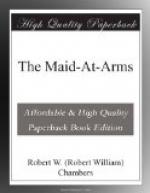As I came out the horses arrived, and I hastened forward to put her into her saddle, but she was up and astride ere I reached the ground, coolly gathering bridle and feeling with her soft leather toes for the stirrups.
Astonished, for I had never seen a girl so mounted, I climbed to my saddle and wheeled my mare, following her out across the lawn, through the stockade and into the road, where I pushed my horse forward and ranged up beside her at a gallop, just as she reached the bridge.
“See!” she cried, with a sweep of her arm, “there are the children down there fishing under the mill.” And she waved her small cap of silver fox, calling in a clear, sweet voice the Indian cry of triumph, “Koue!”
VIII
RIDING THE BOUNDS
For the first half-mile our road lay over that same golden, hilly country, and through the same splendid forests which I had traversed on my way to the manor. Then we galloped past cultivated land, where clustered spears of Indian corn sprouted above the reddish golden soil, and sheep fed in stony pastures.
Around the cabins of the tenantry, fields of oats and barley glimmered, thin blades pricking the loam, brilliant as splintered emeralds.
A few dropping blossoms still starred the apple-trees, pears showed in tiny bunches, and once I saw a late peach-tree in full pink bloom and an old man hoeing the earth around it. He looked up as we galloped past, saluted sullenly, and leaned on his hoe, looking after us.
Dorothy said he was a Palatine refugee and a rebel, like the majority of Sir Lupus’s tenants; and I gazed curiously at these fields and cabins where gaunt men and gaunter women, laboring among their sprouting vegetables, turned sun-dazzled eyes to watch us as we clattered by; where ragged children, climbing on the stockades, called out to us in little, shrill voices; where feeding cattle lifted sober heads to stare; where lank, yellow dogs rushed out barking and snapping till a cut of the whip sent them scurrying back.
Once a woman came to her gate and hailed us, asking if it was true that the troops had been withdrawn from Johnstown and Kingsborough.
“Which troops?” I asked.
“Ours,” began the woman, then checked herself, and shot a suspicious glance at me.
“The Provincials are still at Johnstown and Kingsborough,” said Dorothy, gently.
A gleam of relief softened the woman’s haggard features. Then her face darkened again and she pointed at two barefooted children shrinking against the fence.
“If my man and I were alone we would not be afraid of the Mohawks; but these—”
She made a desperate gesture, and stood staring at the blue Mayfield hills where, perhaps at that moment, painted Mohawk scouts were watching the Sacandaga.
“If your men remain quiet, Mrs. Schell, you need fear neither rebel, savage, nor Tory,” said Dorothy. “The patroon will see that you have ample protection.”




